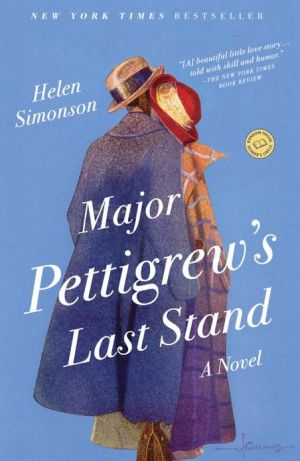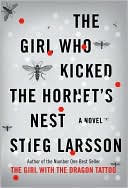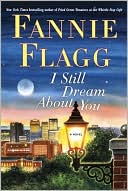Major Pettigrew's Last Stand
In the small village of Edgecombe St. Mary in the English countryside lives Major Ernest Pettigrew (retired), the unlikely hero of Helen Simonson’s wondrous debut. Wry, courtly, opinionated, and completely endearing, the Major leads a quiet life valuing the proper things that Englishmen have lived by for generations: honor, duty, decorum, and a properly brewed cup of tea. But then his brother’s death sparks an unexpected friendship with Mrs. Jasmina Ali, the Pakistani shopkeeper from the...
Search in google:
You are about to travel to Edgecombe St. Mary, a small village in the English countryside filled with rolling hills, thatched cottages, and a cast of characters both hilariously original and as familiar as the members of your own family. Among them is Major Ernest Pettigrew (retired), the unlikely hero of Helen Simonson's wondrous debut. Wry, courtly, opinionated, and completely endearing, Major Pettigrew is one of the most indelible characters in contemporary fiction, and from the very first page of this remarkable novel he will steal your heart.The Major leads a quiet life valuing the proper things that Englishmen have lived by for generations: honor, duty, decorum, and a properly brewed cup of tea. But then his brother's death sparks an unexpected friendship with Mrs. Jasmina Ali, the Pakistani shopkeeper from the village. Drawn together by their shared love of literature and the loss of their respective spouses, the Major and Mrs. Ali soon find their...The Washington Post - Ron CharlesThis thoroughly charming novel wraps Old World sensibility around a story of multicultural conflict involving two widowed people who assume they're done with love. The result is a smart romantic comedy about decency and good manners in a world threatened by men's hair gel, herbal tea and latent racism…If Simonson can keep this up, she could be heir to the late John Mortimer, and if the "Masterpiece Theatre" people aren't already sending out casting calls for Major Pettigrew, they should get a move on with decorous haste.
Major Pettigrew's Last Stand\ A Novel \ \ By Helen Simonson \ Random House Trade Paperbacks\ Copyright © 2011 Helen Simonson All right reserved.\ ISBN: 9780812981223 \ \ \ Chapter One\ Major Pettigrew was still upset about the phone call from his brother’s wife and so he answered the doorbell without thinking. On the damp bricks of the path stood Mrs. Ali from the village shop. She gave only the faintest of starts, the merest arch of an eyebrow. A quick rush of embarrassment flooded to the Major’s cheeks and he smoothed helplessly at the lap of his crimson, clematis-covered housecoat with hands that felt like spades.\ “Ah,” he said.\ “Major?”\ “Mrs. Ali?” There was a pause that seemed to expand slowly, like the universe, which, he had just read, was pushing itself apart as it aged. “Senescence,” they had called it in the Sunday paper.\ “I came for the newspaper money. The paper boy is sick,” said Mrs. Ali, drawing up her short frame to its greatest height and assuming a brisk tone, so different from the low, accented roundness of her voice when it was quiet in the shop and they could discuss the texture and perfume of the teas she blended specially for him.\ “Of course, I’m awfully sorry.” He had forgotten to put the week’s money in an envelope under the outside doormat. He started fumbling for the pockets of his trousers, which were somewhere under the clematis. He felt his eyes watering. His pockets were inaccessible unless he hoisted the hem of the housecoat. “I’m sorry,” he repeated.\ “Oh, not to worry,” she said, backing away. “You can drop it in at the shop later—sometime more convenient.” She was already turning away when he was seized with an urgent need to explain.\ “My brother died,” he said. She turned back. “My brother died,” he repeated. “I got the call this morning. I didn’t have time.” The dawn chorus had still been chattering in the giant yew against the west wall of his cottage, the sky pink, when the telephone rang. The Major, who had been up early to do his weekly housecleaning, now realized he had been sitting in a daze ever since. He gestured helplessly at his strange outfit and wiped a hand across his face. Quite suddenly his knees felt loose and he could sense the blood leaving his head. He felt his shoulder meet the doorpost unexpectedly and Mrs. Ali, quicker than his eye could follow, was somehow at his side propping him upright.\ “I think we’d better get you indoors and sitting down,” she said, her voice soft with concern. “If you will allow me, I will fetch you some water.” Since most of the feeling seemed to have left his extremities, the Major had no choice but to comply. Mrs. Ali guided him across the narrow, uneven stone floor of the hallway and deposited him in the wing chair tucked just inside the door of the bright, book-lined living room. It was his least favorite chair, lumpy cushioned and with a hard ridge of wood at just the wrong place on the back of his head, but he was in no position to complain.\ “I found the glass on the draining board,” said Mrs. Ali, presenting him with the thick tumbler in which he soaked his partial bridgework at night. The faint hint of spearmint made him gag. “Are you feeling any better?”\ “Yes, much better,” he said, his eyes swimming with tears. “It’s very kind of you.?.?.?.”\ “May I prepare you some tea?” Her offer made him feel frail and pitiful.\ “Thank you,” he said. Anything to get her out of the room while he recovered some semblance of vigor and got rid of the housecoat.\ It was strange, he thought, to listen again to a woman clattering teacups in the kitchen. On the mantelpiece his wife, Nancy, smiled from her photo, her wavy brown hair tousled, and her freckled nose slightly pink with sunburn. They had gone to Dorset in May of that rainy year, probably 1973, and a burst of sunlight had briefly brightened the windy afternoon; long enough for him to capture her, waving like a young girl from the battlements of Corfe Castle. Six years she had been gone. Now Bertie was gone, too. They had left him all alone, the last family member of his generation. He clasped his hands to still a small tremor.\ Of course there was Marjorie, his unpleasant sister-in-law; but, like his late parents, he had never fully accepted her. She had loud, ill-formed opinions and a north country accent that scraped the eardrum like a dull razor. He hoped she would not look for any increase in familiarity now. He would ask her for a recent photo and, of course, Bertie’s sporting gun. Their father had made it clear when he divided the pair between his sons that they were to be restored in the event of death, in order to be passed along intact within the family. The Major’s own gun had lain solitary all these years in the double walnut box, a depression in the velvet lining indicating the absence of its mate. Now they would be restored to their full value—around a hundred thousand pounds, he imagined. Not that he would ever dream of selling. For a moment he saw himself quite clearly at the next shoot, perhaps on one of the riverside farms that were always plagued with rabbits, coming up to the invited group, bearing the pair of guns casually broken over his arm.\ “Good God, Pettigrew, is that a pair of Churchills?” someone would say—perhaps Lord Dagenham himself, if he was shooting with them that day—and he would casually look, as if he had forgotten, and reply, \ “Yes, matched pair. Rather lovely walnut they used when these were made,” offering them up for inspection and admiration.\ A rattling against the doorjamb startled him out of this pleasant interlude. It was Mrs. Ali with a heavy tea tray. She had taken off her green wool coat and draped her paisley shawl around the shoulders of a plain navy dress, worn over narrow black trousers. The Major realized that he had never seen Mrs. Ali without the large, stiff apron she always wore in the shop.\ “Let me help you with that.” He began to rise from the chair.\ “Oh, I can manage perfectly well,” she said, and brought the tray to the nearby desk, nudging the small stack of leather books aside with one corner. “You must rest. You’re probably in shock.”\ “It was unexpected, the telephone ringing so absurdly early. Not even six o’clock, you know. I believe they were all night at the hospital.”\ “It was unexpected?”\ “Heart attack. Quite massive apparently.” He brushed a hand over his bristled mustache, in thought. “Funny, somehow you expect them to save heart attack victims these days. Always seem to on television.” Mrs. Ali wobbled the spout of the teapot against a cup rim. It made a loud chonk and the Major feared a chip. He recollected (too late) that her husband had also died of a heart attack. It was perhaps eighteen months or two years now. “I’m sorry, that was thoughtless—” She interrupted him with a sympathetic wave of dismissal and continued to pour. “He was a good man, your husband,” he added.\ What he remembered most clearly was the large, quiet man’s restraint. Things had not been altogether smooth after Mr. Ali took over old Mrs. Bridge’s village shop. On at least two occasions the Major had seen Mr. Ali, on a crisp spring morning, calmly scraping spray paint from his new plate glass windows. Several times, Major Pettigrew had been in the store when young boys on a dare would stick their enormous ears in the door to yell “Pakis go home!” Mr. Ali would only shake his head and smile while the Major would bluster and stammer apologies. The furor eventually died down. The same small boys slunk into the store at nine o’clock at night when their mothers ran out of milk. The most stubborn of the local working men got tired of driving four miles in the rain to buy their national lottery tickets at an “English” shop. The upper echelons of the village, led by the ladies of the various village committees, compensated for the rudeness of the lower by developing a widely advertised respect for Mr. and Mrs. Ali. The Major had heard many a lady proudly speak of “our dear Pakistani friends at the shop” as proof that Edgecombe St. Mary was a utopia of multicultural understanding.\ When Mr. Ali died, everyone had been appropriately upset. The village council, on which the Major sat, had debated a memorial service of some kind, and when that fell through (neither the parish church nor the pub being suitable) they had sent a very large wreath to the funeral home.\ “I am sorry I did not have an opportunity to meet your lovely wife,” said Mrs. Ali, handing him a cup.\ “Yes, she’s been gone some six years now,” he said. “Funny really, it seems like both an eternity and the blink of an eye all at the same time.”\ “It is very dislocating,” she said. Her crisp enunciation, so lacking among many of his village neighbors, struck him with the purity of a well-tuned bell. “Sometimes my husband feels as close to me as you are now, and sometimes I am quite alone in the universe,” she added.\ “You have family, of course.”\ “Yes, quite an extended family.” He detected a dryness in her tone. “But it is not the same as the infinite bond between a husband and wife.”\ “You express it perfectly,” he said. They drank their tea and he felt a sense of wonder that Mrs. Ali, out of the context of her shop and in the strange setting of his own living room, should be revealed as a woman of such great understanding. “About the housecoat,” he said.\ “Housecoat?”\ “The thing I was wearing.” He nodded to where it now lay in a basket of National Geographics. “It was my wife’s favorite housecleaning attire. Sometimes I, well...”\ “I have an old tweed jacket that my husband used to wear,” she said softly. “Sometimes I put it on and take a walk around my garden. And sometimes I put his pipe in my mouth to taste the bitterness of his tobacco.” She flushed a warmer shade and lowered her deep brown eyes to the floor, as if she had said too much. The Major noticed the smoothness of her skin and the strong lines of her face.\ “I still have some of my wife’s clothes, too,” said the Major. “After six years, I don’t know if they still smell of her perfume or whether I just imagine it.” He wanted to tell her how he sometimes opened the closet door to thrust his face against the nubby suits and the smooth chiffon blouses. Mrs. Ali looked up at him and behind her heavy-lidded eyes he thought she too might be thinking of such absurd things.\ “Are you ready for more tea?” she asked and held out her hand for his cup.\ When Mrs. Ali had left, she making her excuses for having invited herself into his home and he making his apologies for inconveniencing her with his dizzy spell, the Major donned his housecoat once more and went back to the small scullery beyond the kitchen to finish cleaning his gun. He was conscious of tightness around his head and a slight burn in the throat. This was the dull ache of grief in the real world; more dyspepsia than passion.\ He had left a small china cup of mineral oil warming on its candle stand. He dipped his fingers in the hot oil and began to rub it slowly into the burled walnut root of the gun stock. The wood became silk under his fingertips. He relaxed into his task and felt his grief ease, making room for the tiniest flowering of a new curiosity.\ Mrs. Ali was, he half suspected, an educated woman, a person of culture. Nancy had been such a rare person, too, fond of her books and of little chamber concerts in village churches. But she had left him alone to endure the blunt tweedy concerns of the other women of their acquaintance. Women who talked horses and raffles at the hunt ball and who delighted in clucking over which unreliable young mother from the council cottages had messed up arrangements for this week’s play group at the Village Hall. Mrs. Ali was more like Nancy. She was a butterfly to their scuffle of pigeons. He acknowledged a notion that he might wish to see Mrs. Ali again outside of the shop, and wondered whether this might be proof that he was not as ossified as his sixty-eight years, and the limited opportunities of village life, might suggest.\ Bolstered by the thought, he felt that he was up to the task of phoning his son, Roger, in London. He wiped his fingertips on a soft yellow rag and peered with concentration at the innumerable chrome buttons and LED displays of the cordless phone, a present from Roger. Its speed dial and voice activation capabilities were, Roger said, useful for the elderly. Major Pettigrew disagreed on both its ease of use and the designation of himself as old. It was frustratingly common that children were no sooner gone from the nest and established in their own homes, in Roger’s case a gleaming black-and-brass-decorated penthouse in a high-rise that blighted the Thames near Putney, than they began to infantilize their own parents and wish them dead, or at least in assisted living. It was all very Greek, the Major thought. With an oily finger, he managed to depress the button marked “1—Roger Pettigrew, VP, Chelsea Equity Partners,” which Roger had filled in with large, childlike print. Roger’s private equity firm occupied two floors in a tall glass office tower in London’s Docklands; as the phone rang with a metallic ticking sound, the Major imagined Roger in his unpleasantly sterile cubicle with the battery of computer monitors and the heap of files for which some very expensive architect had not bothered to provide drawers.\ Roger had already heard.\ “Jemima has taken on the call-making. The girl’s hysterical, but there she is, calling everyone and his dog.”\ “It helps to keep busy,” suggested the Major.\ “More like wallowing in the whole bereaved-daughter role, if you ask me,” said Roger. “It’s a bit off, but then they’ve always been that way, haven’t they?” His voice was muffled and the Major assumed this meant he was once again eating at his desk.\ “That’s unnecessary, Roger,” he said firmly. Really, his son was becoming as unedited as Marjorie’s family. The city was full of blunt, arrogant young men these days and Roger, approaching thirty, showed few signs of evolving past their influence.\ “Sorry, Dad. I’m very sorry about Uncle Bertie.” There was a pause. “I’ll always remember when I had chicken pox and he came over with that model plane kit. He stayed all day helping me glue all those tiny bits of balsa together.”\ “As I recall you broke it against the window the next day, after you’d been warned against flying it indoors.”\ “Yeah, and you used it as kindling for the kitchen stove.”\ “It was broken to pieces. No sense in wasting it.” The memory was quite familiar to them both. The same story came up over and over at family parties. Sometimes it was told as a joke and they all laughed. Sometimes it was a cautionary lecture to Jemima’s willful son. Today the hint of reproach was showing along the seams.\ “Will you come down the night before?” asked the Major.\ “No, I’ll take the train. But listen, Dad, don’t wait for me. It’s possible I might get stuck.”\ From the Hardcover edition.\ Continues...\ \ \ \ Excerpted from Major Pettigrew's Last Stand by Helen Simonson Copyright © 2011 by Helen Simonson. Excerpted by permission.\ All rights reserved. No part of this excerpt may be reproduced or reprinted without permission in writing from the publisher.\ Excerpts are provided by Dial-A-Book Inc. solely for the personal use of visitors to this web site. \ \
\ From Barnes & NobleMajor Ernest Pettigrew, retired, of Edgecombe St. Mary, England, is more than a little dismayed by the sloppy manners, narcissism, and materialism of modern society. The decline of gentility is evident everywhere, from tea bags, to designer sweaters, to racism masquerading as tolerance. \ Mutual grief allies him with Mrs. Ali, a widowed local shopkeeper of Pakistani descent who has also resigned herself to dignified, if solitary, last years. The carefully suppressed passion between these two spawns twitters of disapproval in their provincial village, but Pettigrew hasn't time for such silliness: real estate developers are plotting to carpet the fields outside his back door with mansionettes and his sister-in-law plans to auction off a prized family firearm. Meanwhile, Mrs. Ali's late husband's Muslim family expects her to hand over her hard-won business to her sullen, fundamentalist nephew, a notion she finds repellant and chauvinistic.\ It's a testament to Simonson that in this delightful novel, Pettigrew must navigate the tragic, the absurd, and the transcendentally joyful aspects of a familiar life turned upside down by an unfamiliar and unexpected late-life love affair. That two people from opposing and mutually distrusting worlds are able to bridge every gap with unerring respect and decorum serves as a quiet suggestion that larger conflicts might be avoided or resolved in much the same way. Finally, a way forward that Major Pettigrew would approve.\ \ \ \ \ \ Janet Maslin…funny, barbed, delightfully winsome storytelling…As with the polished work of Alexander McCall Smith, there is never a dull moment…this book feels fresh despite its conventional blueprint. Its main characters are especially well drawn, and Ms. Simonson makes them as admirable as they are entertaining. They are traditionally built, and that's not just Mr. McCall Smith's euphemism. It's about intelligence, heart, dignity and backbone. Major Pettigrew's Last Stand has them all.\ —The New York Times\ \ \ Ron CharlesThis thoroughly charming novel wraps Old World sensibility around a story of multicultural conflict involving two widowed people who assume they're done with love. The result is a smart romantic comedy about decency and good manners in a world threatened by men's hair gel, herbal tea and latent racism…If Simonson can keep this up, she could be heir to the late John Mortimer, and if the "Masterpiece Theatre" people aren't already sending out casting calls for Major Pettigrew, they should get a move on with decorous haste.\ —The Washington Post\ \ \ \ \ Alexander McCall Smith…an entertaining and even rather moving novel of goings-on in a thin, gimcrack England that is, alas, only too recognizable…The real pleasure of this book derives not from its village conventions but from its beautiful little love story, which is told with skill and humor…Major Pettigrew's Last Stand is refreshing in its optimism and its faith in the transformative possibilities of courtesy and kindness. Although pitched toward those wanting a gentle read, it also slides a powerful moral message into the interstices of village politics. And as for happy endings, it deserves all available prizes.\ —The New York Times Book Review\ \ \ \ \ Publishers WeeklyIn her charming debut novel, Simonson tells the tale of Maj. Ernest Pettigrew, an honor-bound Englishman and widower, and the very embodiment of duty and pride. As the novel opens, the major is mourning the loss of his younger brother, Bertie, and attempting to get his hands on Bertie's antique Churchill shotgun—part of a set that the boys' father split between them, but which Bertie's widow doesn't want to hand over. While the major is eager to reunite the pair for tradition's sake, his son, Roger, has plans to sell the heirloom set to a collector for a tidy sum. As he frets over the guns, the major's friendship with Jasmina Ali—the Pakistani widow of the local food shop owner—takes a turn unexpected by the major (but not by readers). The author's dense, descriptive prose wraps around the reader like a comforting cloak, eventually taking on true page-turner urgency as Simonson nudges the major and Jasmina further along and dangles possibilities about the fate of the major's beloved firearms. This is a vastly enjoyable traipse through the English countryside and the long-held traditions of the British aristocracy. (Mar.)\ \ \ \ \ Library JournalSixty-eight-year-old Maj. Ernest Pettigrew has settled into a genteel life of quiet retirement in his beloved village of Edgecombe St. Mary. Refined, gentlemanly, unwaveringly proper in his sense of right vs. wrong, and bemused by most things modern, he has little interest in cavalier relationship mores, the Internet, and crass developments and is gently smitten by the widowed Mrs. Ali, the lovely Pakistani owner of the local shop where he buys his tea. After the unsettling death of his brother, Bertie, the Major finds his careful efforts to court Mrs. Ali (who shares his love of literature) constantly nudged off-course by his callow son, Roger; a handful of socialite ladies planning a dinner/dance at the Major's club; and the not-so-subtle racist attitudes his interest in Mrs. Ali engender. VERDICT This irresistibly delightful, thoughtful, and utterly charming and surprising novel reads like the work of a seasoned pro. In fact, it is Simonson's debut. One cannot wait to see what she does next. [See Prepub Alert, LJ 11/15/09.]—Beth E. Andersen, Ann Arbor Dist. Lib., MI\ \ \ \ \ Kirkus ReviewsSet-in-his-ways retired British officer tentatively courts charming local widow of Pakistani descent. Shortly after being informed that his younger brother Bertie has suddenly passed away from a coronary, Maj. Ernest Pettigrew answers his door to find Mrs. Ali, proprietress of his village food shop. She's on an errand, but when she steps in to help the somewhat older man during a vulnerable moment, something registers; then they bond over a shared love of Kipling and the loss of their beloved spouses. Their friendship grows slowly, with the two well aware of their very different lives. Though born in England, Mrs. Ali is a member of the Pakistani immigrant community and is being pressured by her surly, religious nephew Abdul Wahid to sign over her business to him. The major belongs to a non-integrated golf club in their village and is girding himself for a messy battle with his sister-in-law Marjorie over a valuable hunting rifle that should rightfully have gone to him after Bertie's death. He also must contend with his grown son Roger, a callow, materialistic Londoner who appears in the village with a leggy American girlfriend and plans to purchase a weekend cottage for reasons that seem more complex than mere family unity. Add to that a single mum with a small boy who bears a striking resemblance to Abdul Wahid, and you have enough distractions to keep the mature sweethearts from taking it to the next level. But the major rallies and asks Mrs. Ali to accompany him to the annual club dance, which happens to have an ill-advised "Indian" theme. The event begins magically but ends disastrously, with the besotted major fearing he has lost his love forever. His only chance at winning her backis to commit to a bold sacrifice without any guarantees it will actually work. Unexpectedly entertaining, with a stiff-upper-lip hero who transcends stereotype, this good-hearted debut doesn't shy away from modern cultural and religious issues, even though they ultimately prove immaterial.\ \







